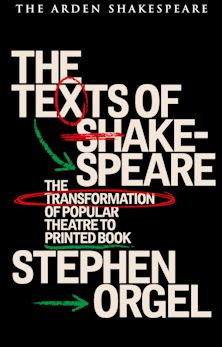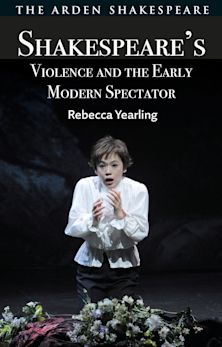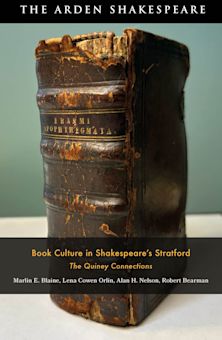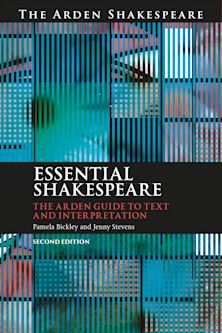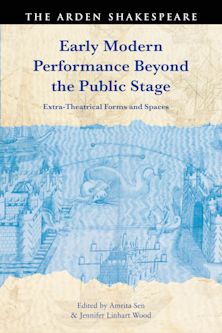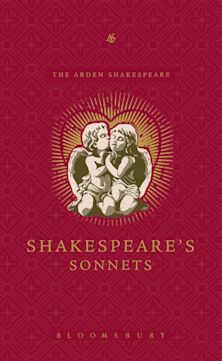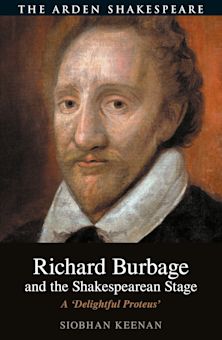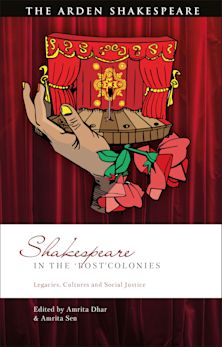- Home
- ACADEMIC
- Drama & Performance Studies
- Shakespeare Studies and Criticism
- Godless Shakespeare
You must sign in to add this item to your wishlist. Please sign in or create an account
Description
Following Dante's three part structure for The Divine Comedy - Hell represents expressions of religious faith in Shakespeare's plays, Purgatory sets out more sceptical positions, and Heaven shows articulations of godlessness - Mallin traces a spiritual ascent from the unthinkingly devout to the atheistically spiritual. This polemical, vigorous account focuses on the moral and spiritual dilemmas of major characters, developing the often subtle transitions between belief, scepticism and atheism. Finally, Godless Shakespeare argues for the liberating potential of unbelief.
Table of Contents
HELL - Religious Faith
Pericles: God's Bitch
Hamlet: Hamlet's Dark Song
Isabella: Replacement Theology
Titus: Crackers
PURGATORY- Skepticism
Antonio: Conspicuously Failed Christ Figures Named
Portia: The Profit Driven Life
Katherina: Sun, Moon, Loss of Light
Hamlet: Happy Suicide
Leontes and audience: It is Required
HEAVEN- Godlessness
Aaron: Aaron Ascendant
Macbeth: The Life to Come
Bottom: Dreams of Sex and Death
Cleopatra: Her Becomings
References
Index
Product details
| Published | 15 Feb 2007 |
|---|---|
| Format | Ebook (Epub & Mobi) |
| Edition | 1st |
| Extent | 144 |
| ISBN | 9781441103482 |
| Imprint | Continuum |
| Series | Shakespeare Now! |
| Publisher | Bloomsbury Publishing |
About the contributors
Reviews
-
"Always intriguing, usually provocative and occasionally infuriating, Godless Shakespeare is a brilliant meditation on Shakespeare's ways with his characters and the systems of moral values in which we place them. Mallin's Shakespeare is never constricted by conventional parameters of religion and belief but instead is a thoroughly original creator, demanding our engaged moral response to his creations. In Mallin's excitingly heterodox cosmology, Cleopatra and Aaron, Pericles and Isabella find themselves with unexpected companions in the new heaven, hell and purgatory in which Mallin arranges them. Thinking about Shakespeare and religion has never seemed such fun." - Professor Peter Holland, Notre Dame University, USA
Professor Peter Holland, Notre Dame University
-
"If Nietzsche were put in charge of Dente's afterlife, and then asked to find appropriate places for Shakespeare's characters, the result would be something like this. Eric Mallin's perverse and excoriating anti-metaphysic shows just how many settled assumptions about Shakespeare are overturned when religion in his plays is taken seriously. Audacious and innovative, Mallin conflates renaissance scepticism and modern atheism, scattering light and darkness equally as he sears Christianity with a torch lit from the Christian flame." - Professor Graham Holderness, University of Hertfordshire, UK
Professor Graham Holderness, University of Hertfordshire, UK
-
"At last! An iconoclastic Shakespeare with a mind and spirit unconstrained by orthodox religion. Eric Mallin guides us through the undiscovered country where the bard's spirituality survives in and as unbelief. Godless Shakespeare is beautifully written, well-conceived, and irresistibly funny. I felt as though I were encountering the plays for the first time." - Professor David Riggs, author of The World of Christopher Marlowe
Professor David Riggs, author of The World of Christopher Marlowe
-
"Defying recent Catholic and Protestant claims to Shakespeare's endorsement, and challenging Stephen Greenblatt's claim that Renaissance atheism was merely a defensive shadow cast by Christianity, Mallin's wide-ranging book suggests that Shakespeare recognized Christianity as a defense against the burdens of unbelief, which has important values of its own. With its taxonomy of characters into a non-religious ethical hierarchy, Godless Shakespeare jauntily defies the conventional wisdom about a writer who himself typically defied such wisdom." - Professor Robert Watson, UCLA, USA
Professor Robert Watson, UCLA
-
-Mention. Daily Telegraph/ April 8, 2007
Daily Telegraph
-
"This is a persuasive and well-argued work, based on evidence and examples from key texts in the Shakespearean oeuvre. It succeeds very well in fulfilling the aim of the general editors of the series in reaching out to the general reader, without compromising its scholarly rigor." -Abdulla Al-Dabbagh, The Sixteenth Century Journal, Vol. 39, Winter 2008

ONLINE RESOURCES
Bloomsbury Collections
This book is available on Bloomsbury Collections where your library has access.












